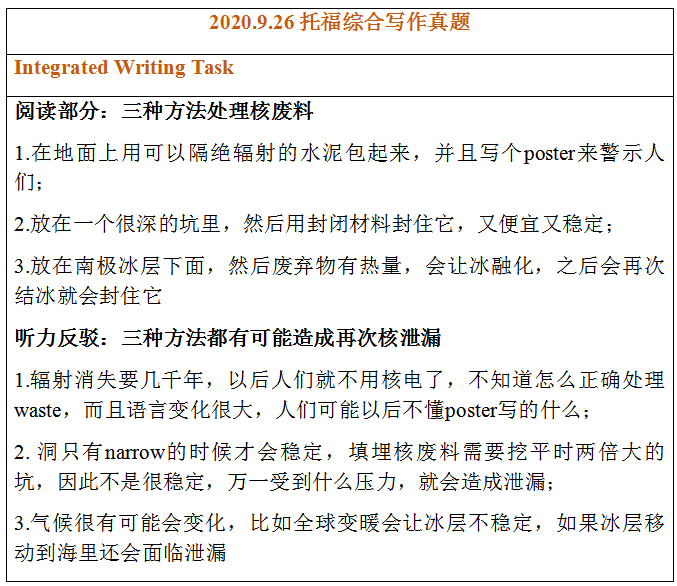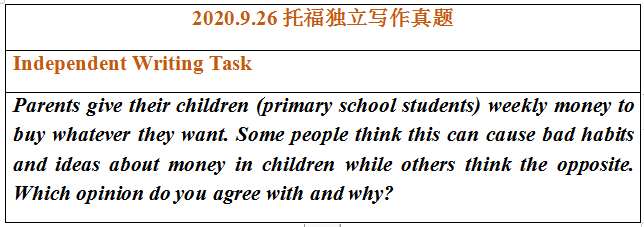
北美考试院 托福写作组 卢雅静

本次综合写作是2019年9月21日的真题,话题是综合写作中较为少见的环保类题目。话题看上去难度较大,事实上阅读和听力中专业名词并不多,大家不需要有畏惧心理。根据近年来的综合写作趋势,后面依然会以生物和生态话题为主,但是其他过去较为少见的学科话题诸如环保、商业、建筑、健康等在综合写作中的占比也开始变得越来越大,这就需要同学们更为积极地去积累一些学科话题,为综合写作理解阅读和抓取听力打下基础。
Key words: nuclear waste, radiation, leakage

题目解析:
9月26日的写作题重复了2017年11月11日的真题,相信很多备考的同学们对这道题应该并不陌生。家庭教育话题,在托福独立写作中属于教育类中的小类别,出现的频率不高,难度也不会很大,因此考场上遇到这道题的同学们大概是松了一口气吧?
此题需要讨论家长每周给小孩子零花钱好不好,正反方都有较为好扩充的分论点。如果觉得给零花钱好,可供参考的分论点有:①教育小孩理财意识;②培养独立性和责任感;③方便小孩与他人社交;如果认为这样不好,可供参考的分论点有:①避免小孩相互攀比;②避免沾染恶习。
请参考以下范文:
Parents nowadays sometimes feel resemble an ATM machine to their children and every time they enter a shopping center, they come out with purse or pockets empty. With the improving living standards, children’s demands vary and they desire what their peers have, leading their parents to be under financial pressure to provide it all. Therefore, taking various factors ranging from the children’s ages to the family financial circumstances into account, giving pocket money to children weekly can be a choice that benefits both the parents and children at the same time.
It is true that giving a child an allowance, particularly a regular, unconditional allowance is not of complete advantages. Some believe that, children, who receive regular unconditional allowance, tend to view this as an entitlement. It is likely that they have diminished financial literacy, lower levels of motivation and an increased aversion to work or study. Further, many are worried that the weekly allowance may be used for drink or even worse, drugs.
However, a weekly allowance is a de facto opportunity for parents to teach financial decision making, budgeting and money management to their children – lessons that many grownups have not learned. Specifically speaking, giving weekly allowance does not mean laissez-faire but requires parents to be involved and committed to their kids learning financial literacy and developing beneficial habits. It is crucial for parents to share the family’s financial constraints to their children at the beginning so as to prevent their children from seeing allowance as an entitlement. By settling with the children about what the allowance is meant to be spent on and the rules and purpose of the allowance, the children will gradually develop skills of money management and saving habit, and thus avoid unnecessary purchases.
On the other hand, the weekly pocket money enables children to make their own decisions. Children have so little independence these days. Without parents’ constant interference with the children’s decisions on what to do with their allowance, children will feel being respected. In response to the trust of their parents, most children will not abuse the independence and trust they are enjoying, rather, the learn to take responsibility for their own actions. Researches have shown that when it comes out of their own pockets, the children are much more selective about their purchases. They will think twice before buying an item. As a result, children learn to spend the pocket money more carefully and wisely.
To sum up, with regard to the discussion about weekly pocket money, I firmly contend that giving children weekly allowance is an idea whose time has come.